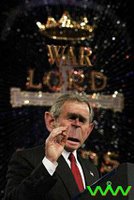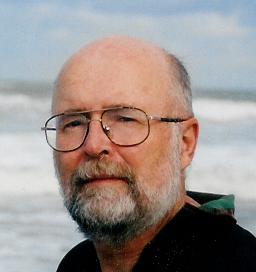 So many of my favorite bloggers have posted on the speech the talking Codpiece spewed Wednesday I'll keep my remaarks to a minimum. First, I'll say something about the reactions here in Denmark.
So many of my favorite bloggers have posted on the speech the talking Codpiece spewed Wednesday I'll keep my remaarks to a minimum. First, I'll say something about the reactions here in Denmark.The Prime Minister, Anders Fogh, came with a real suck-up reaction saying that in the USA they had the intelligence reports and military expertise, so he wouldn't try to second guess the Codpiece.
Mr. Fogh's problem is that the Danes now want the troops home (we have some 800 pairs of boots on the ground in southern Iraq) and he is wiggling to keep his brownie points with the US while not losing support for his coalition gov't.
The opposition parties were all over him, much more than normal. The leader of the Peoples Social Party [Socialistisk Folkeparti] said that if killing more people was the goal, then Bush was on the right course.
We didn't get much of a clip of the Codpiece speaking, so I don't know if I can agree with the observation of many of my favorite bloggers that he looked spooked, frightened, or maybe even tranquilized.
In any case, it wasn't the man with a hard-on we saw almost four years ago when he announced the start of the war to prove he had a bigger manly thing than his dad.
That said, there's a certain place where I can find myself feeling something like pity for the fellow, but it's not a big place and I don't go there all that often.
The bottom line is, of course, is all this leading to a real attack on Iran?
It would seem that that the deck has been stacked for something of that order. An hour before the speech was aired, five helicopters landed on an Iranian consulate in Irbil in northern Iraq and demanded their surrender or they would be killed.
This is heavy stuff, folks, and close to a de facto declaration of war.
The American military has issued statements that it was not really a consulate and therefore did not have diplomatic status. Well, that establishes the plausible deniability at least -- good to know that someone is doing their homework!
Speaking of homework, a couple of days ago I was making bets with myself on how many times the word "sacrifice" would be heard in the speech. My guess was three and that hit the nail on the head if I allow that the plural of sacrifice counts.
The three times reference was made to "sacrifice" was at the end of the speech and each was in a slightly different meaning.
The first was the "quiet sacrifice" of the families who have "...lonely holidays and empty chairs at the dinner table".
The second refereed to the "fallen Americans" whom "we mourn" and that this has put us in a debt which we can only pay back by "...building a future worthy of their sacrifice".
The third time was a promise that, "The year ahead will require more patience, sacrifice and resolve."
The line which follows was astounding:
"It can be tempting to think that America can put aside the burdens of freedom."This sounds so much like that poet of Empire, Rudyard Kipling's "The White Man's Burden" that it's enough to make my brain puke.
Kipling's poem was a response to the American take over of the Philippines after the Spanish-American war.
The Philippines, as you should know, was the place where America first practiced genocide, that is if you discount that which was needed in settling the West.




No comments:
Post a Comment